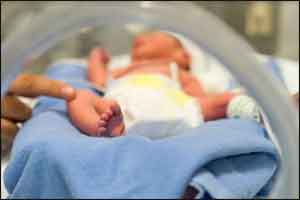- Home
- Editorial
- News
- Practice Guidelines
- Anesthesiology Guidelines
- Cancer Guidelines
- Cardiac Sciences Guidelines
- Critical Care Guidelines
- Dentistry Guidelines
- Dermatology Guidelines
- Diabetes and Endo Guidelines
- Diagnostics Guidelines
- ENT Guidelines
- Featured Practice Guidelines
- Gastroenterology Guidelines
- Geriatrics Guidelines
- Medicine Guidelines
- Nephrology Guidelines
- Neurosciences Guidelines
- Obs and Gynae Guidelines
- Ophthalmology Guidelines
- Orthopaedics Guidelines
- Paediatrics Guidelines
- Psychiatry Guidelines
- Pulmonology Guidelines
- Radiology Guidelines
- Surgery Guidelines
- Urology Guidelines
Cooling treatment reduces epilepsy in children

Cooling babies deprived of oxygen at birth (perinatal asphyxia) can reduce the number of children who develop epilepsy later in childhood, according to a new study published in the journal Epilepsia.
The study has been led by Marianne Thoresen, Professor of Neonatal Neuroscience, from the Bristol Medical School: Translational Health Sciences at the University of Bristol.
It is known that newborn babies who suffer perinatal asphyxia may develop permanent brain injury resulting in cerebral palsy or other conditions, like epilepsy. Until recently, 20 to 30 percent of these patients would develop epilepsy and many need regular antiepileptic treatment. The patients' cognitive performance, life quality and life expectancy is also affected by having the condition.
The research team has developed and delivered cooling treatment, known as therapeutic hypothermia, for newborns who suffer lack of oxygen during birth. For up to eight years, the researchers followed 165 infants who were born in the south west and who received cooling therapy at St Michael's Hospital, Bristol, part of University Hospitals Bristol NHS Foundation Trust. The study examined how many babies were diagnosed with epilepsy and how many are on regular antiepileptic drug treatment at two and four to eight years of age.
The research found that babies, born after 2007, who received the cooling treatment, had much less epilepsy than before cooling treatment was introduced. At two years, seven percent of the children had an epilepsy diagnosis, however, far fewer, only two percent, were on regular antiepileptic drugs.
The study showed that more children had epilepsy when they reached the age of four to eight years with seven percent on regular medication. However, these are very low numbers needing antiepileptic treatment compared to before cooling treatment was introduced as standard of care.
Before therapeutic hypothermia was introduced, poor outcome meaning death or moderate or severe disability was around 66 percent (32 percent death and 34 percent surviving with disability).
In this cohort born after 2007, the number of children with poor outcome is lower at 34 percent (11 percent death and 23 percent survived with disability). Also, the severity of cerebral palsy is milder and seven out of ten are able to walk. Even if a lesser severity of perinatal asphyxia is accounted for, cooling therapy has increased the number of healthy survivors and there are very few children with epilepsy needing drug treatment.
Professor Marianne Thoresen said: "Even if we account for a lesser severity of perinatal asphyxia, our research has shown that therapeutic hypothermia reduces the number of children who develop epilepsy later in childhood. Cooling treatment also reduces the number and severity of cerebral palsy and increases the number of patients who survive normally."

Disclaimer: This site is primarily intended for healthcare professionals. Any content/information on this website does not replace the advice of medical and/or health professionals and should not be construed as medical/diagnostic advice/endorsement or prescription. Use of this site is subject to our terms of use, privacy policy, advertisement policy. © 2020 Minerva Medical Treatment Pvt Ltd